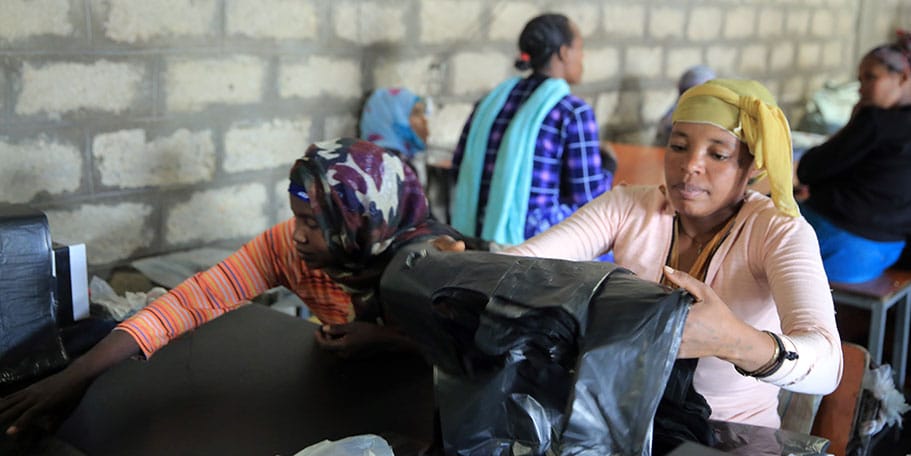
Lobby group demands five-year grace period
Business interests clash with environmental and health concerns as a lobby group representing Ethiopian plastics manufacturers demands a five-year grace period before the implementation of a new federal law banning the production and use of plastic bags.
The Ethiopian Plastic and Rubber Manufacturers Association says it wants to see its members given time to adjust to the Solid Waste Management and Disposal Proclamation approved by lawmakers earlier this month. The Proclamation prohibits the production of single-use plastics, with manufacturers obligated to halt operations within the coming six months.
Officials cite environmental and health concerns as a basis for the law, which they hope to see usher in a new, plastic-free normal.
However, Bereket Gebrehiwet, a representative of the lobby group, says the law could force many factories to shut down entirely.
– Advertisement –
He argues that Ethiopian manufacturers already rely heavily on recycling to produce single-use plastics.
“We are buying back the plastic we originally produced from collectors,” he said. “We pay up to 150 birr per kilogram for plastic waste, and this practice has saved the country approximately USD 350 million that would have otherwise been spent on raw material imports.”
He stressed that manufacturers are not opposed to the Proclamation itself, but they were not properly consulted during its drafting process.
“The six-month transition period is not sufficient. Unlike Kenya, which granted a three-year preparation period, Ethiopia’s regulation forces factories to shut down immediately—leaving expensive imported machines unused. The contribution of this sector to the economy has been overlooked,” he added.
Bereket noted that adapting to renewable energy requires major investment and planning.
“We need at least five years to make a full transition. It is unrealistic to expect manufacturers to shift to renewable energy overnight,” he said.
Bereket pointed to the scarcity and unaffordability of biodegradable alternatives for single-use plastics.
Ali Sultan, manager of Al-Qesib Plastic Factory in Sheger City’s Tatek Industrial Zone, echoed similar concerns.
“We are being forced to close a factory we have operated for years. We employ more than 110 permanent workers. This sudden ban on single-use plastics is pushing us toward bankruptcy and threatens the livelihoods of our skilled workers,” he said.
According to Ali, some manufacturers were in the process of importing machinery for single-use plastic production when the law was passed.
“Current machines cannot be easily repurposed—they would have to be sold off as scrap metal, which would be a massive loss. It will take five to eight years to fully convert to renewable alternatives,” he said.
Meanwhile, companies producing biodegradable alternatives are seeing a surge in demand.
Biruk Somano, CEO of BI Packaging, which produces biodegradable paper bags at a plant in the Ferensay Legasion neighborhood of Addis Ababa, is among those enjoying the uptick.
“We employ 11 workers and produce 150–300 paper bags per worker daily,” he said, adding that orders have increased dramatically over the last couple of weeks.
BI Packaging is looking to import more machinery to meet the rising demand but lacks financial support, according to Biruk.
“We need loans. There’s a severe shortage of raw materials, and quality paper is hard to find. Public awareness about paper bags is still limited. We currently sell each paper bag for 23 birr and urgently need support to expand our production facility,” he said.
At the Ethiopia Tamrit Expo organized last month, Industry Minister Melaku Alebel stated that the government would facilitate adjustments to help factories operate without disruption and claimed that eco-friendly alternatives would be offered to manufacturers.
“Protecting the environment is a constitutional right of citizens, and we must balance investor interests with environmental protection,” he said.
However, Bereket claimed that manufacturers have not been adequately informed about the alternative materials the Ministry of Industry plans to introduce.
“It’s unclear whether these so-called enriched materials meet local factory needs or are compatible with existing machines,” he said.
A study conducted by the non-governmental organization Plastic Pack Ethiopia (PPE) revealed that plastic use in Ethiopia is increasing at an alarming rate of 11 percent annually.
In 2007, the average Ethiopian used less than one kilogram of plastic per year. By 2022, that number had risen to three kilograms, with residents of Addis Ababa consuming up to seven kilograms annually.
Ethiopia has also become one of the largest investors in plastic technology in East and Central Africa. In 2021, the country imported 25 million Euros worth of plastic manufacturing technology, ranking among the top two importers in the region.
.
.
.
#SingleUse #Plastics #Ban #Draws #Fire #Manufacturers
Source link











